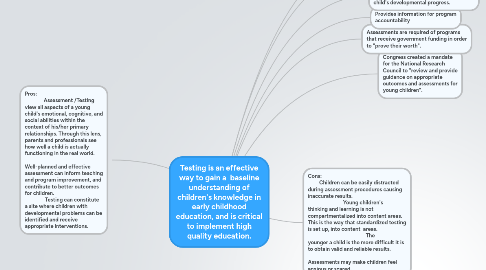Testing is an effective way to gain a baseline understanding of children's knowledge in early childhood education, and is critical to implement high quality education.
作者:shawn mcmorris

1. Pros: Assessment /Testing view all aspects of a young child's emotional, cognitive, and social abilities within the context of his/her primary relationships. Through this lens, parents and professionals see how well a child is actually functioning in the real world. Well-planned and effective assessment can inform teaching and program improvement, and contribute to better outcomes for children. Testing can constitute a site where children with developmental problems can be identified and receive appropriate interventions.
2. Congress created a mandate for the National Research Council to "review and provide guidance on appropriate outcomes and assessments for young children".
3. Assessments are required of programs that receive government funding in order to "prove their worth".
4. Provides information for program accountability
5. Assessments provide caregivers and teachers with a better understanding of a child's developmental progress.
6. Policies were created to ensure that adequate accomplishments were being met in particular domains- reading, math, etc.
7. History of Assessment in Early Childhood Education
8. Cons: Children can be easily distracted during assessment procedures causing inaccurate results. Young children's thinking and learning is not compartmentalized into content areas. This is the way that standardized testing is set up, into content areas. The younger a child is the more difficult it is to obtain valid and reliable results. Assessments may make children feel anxious or scared.


